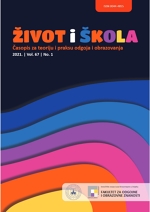RELATIONSHIP BETWEEN PROBLEMATIC GAMING AND EMOTIONAL INTELLIGENCE AND EMPATHY IN EARLY ADOLESCENCE
DOI:
https://doi.org/10.32903/zs.67.1.4Ključne riječi:
adolescents, computer games, emotional intelligence, empathySažetak
The aim of this study was to determine the relationship between problematic gaming and emotional intelligence and empathy in early adolescence. The study involved N = 143 participants, seventh- and eighth-grade students; n = 76 participants being female. Three instruments were used in the study. E-questionnaire: Emotional Empathy Scale and Imagination Scale, Emotional Skills and Competencies Questionnaire, and Problematic Online Gaming Questionnaire. The research has revealed that problematic gaming is negatively correlated with emotional intelligence, i.e., that adolescents who score higher on the online gaming questionnaire have lower levels of emotional intelligence, and vice versa. Furthermore, problematic gaming is negatively associated with adolescent empathy; adolescents who assess the more frequent presence of behaviors characteristic of problematic gaming have a lower level of empathy, and vice versa. Regarding gender differences, the research showed that, unlike girls, boys are more likely to show behaviors characteristic of problematic gaming, and that the negative association between emotional intelligence and problematic gaming occurs only in boys, while in girls it is absent. The findings of this research indicate the existence of a negative association between empathy and emotional intelligence and problematic gaming, but it does not determine its direction. Further research is needed to shed light on the nature of this association. The findings of this research may serve as a starting point for future more extensive, longitudinal research on the relationship between problematic gaming and emotional functioning.


